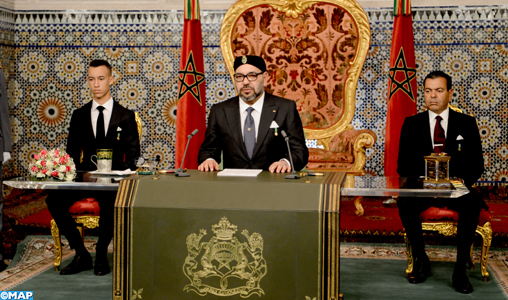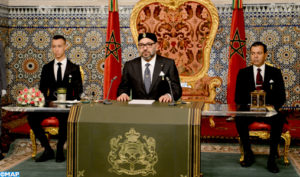
 Morocco’s return to the African Union was underpinned by the Kingdom’s commitment to share in the development dynamic Africa is witnessing and to contribute to tackling the various challenges it is facing.
Morocco’s return to the African Union was underpinned by the Kingdom’s commitment to share in the development dynamic Africa is witnessing and to contribute to tackling the various challenges it is facing.
The remarks were made by King Mohammed VI in a speech he delivered on Tuesday on the 43rd anniversary of the Green March epic that enabled Morocco to recover peacefully its Sahara provinces from Spanish Colonialism in 1975.
“Morocco’s return to its institutional family was not intended as a means to defend the question of the Moroccan Sahara, given that the position of most African nations is similar to ours. Our return to the African Union was dictated by the pride we take in belonging to Africa, as well as by our commitment to share in the development dynamic it is witnessing and to contribute to tackling the various challenges facing the Continent, without compromising our legitimate rights and best interests,” the Sovereign pointed out.
The king who referred to the recent decisions made by the AU Summit, held in Nouakchott, which were consistent with the relevant international positions and principles, said “this constructive attitude means wisdom and far-sightedness have prevailed.”
“It also constitutes a break with ploys that used to proliferate within the African Union. Because of these practices, Africa and African peoples lost precious time that should have been devoted to promoting development and integration”.
King Mohammed VI also underlined the constructive initiatives made by Morocco for the settlement of the regional Sahara conflict, stressing the country’s positive reaction to various international calls for practical proposals that can help achieve a realistic and lasting political settlement based on compromise and on the Autonomy Initiative.
He pointed out that Morocco continues to safeguard its territorial integrity “with clarity, ambition, responsibility and committed action, both domestically and at the United Nations”.
The Sovereign also underlined Morocco’s determination to cooperate with the UN Secretary-General and to support his Personal Envoy Horst Köhler to establish a serious and credible political process, calling for setting a new dynamic in the UN-led negotiations. He said in this connection that the United Nations should take into account the experience and the lessons of the past to avoid the deadlock of the Manhasset process.
Horst Köhler has invited the parties to the conflict, Morocco, Algeria, Mauritania, and the separatist Polisario Front, to a round table in Geneva early December in an attempt to put the UN-sponsored settlement process, deadlocked since 2012, back on track.
King Mohammed VI stated further that the Southern Provinces will carry on progress under the new development model to enable the Moroccan Sahara to play once again its historical role as a bridge between Morocco and sub-Saharan Africa.
In parallel, the implementation of advanced regionalization is contributing to the emergence of a genuine political elite that can effectively and democratically represent the inhabitants of the Sahara and enable them to exercise their right to run their local affairs themselves, and to achieve integrated development in a free and stable environment, underlined the Moroccan Sovereign.
In the same spirit, Morocco will invest in effective, wealth-generating economic partnerships with all countries and economic blocs, including the European Union. However, we shall not be involved in any partnership that undermines our country’s territorial integrity, he said, voicing his resolve to see to it that these partnerships benefit directly the inhabitants of the Moroccan Sahara first and foremost, and that they contribute to improving their livelihoods within their homeland, in an environment characterized by freedom and a dignified life.
King Mohammed VI who also dwelt in his speech on Moroccan-Algerian relations, which are in a state that “is not normal, much less acceptable,” reached out to Algeria saying that Morocco stands ready for a direct and candid dialogue in order to dispel the transient and objective differences that are impeding the development of relations between the two neighboring countries.
The Sovereign reiterated his commitment to work hand in hand with the Algerian brothers and suggested the setting up of a joint political mechanism for dialogue and consultation to break the stalemate in bilateral relations.
The format, nature and level of representation of this joint political mechanism can be mutually agreed upon, he said, explaining that the mission of this mechanism “would be to analyze all the issues on hand in good faith and in a very frank, objective and honest way, using an open-ended agenda, without conditions or exceptions”.
“This mechanism can also serve as a practical platform for cooperation regarding all bilateral matters, particularly with respect to making the most of the numerous development opportunities existing in the Maghreb region,” he said.
The Sovereign explained further that this mechanism will also contribute to enhancing bilateral coordination and consultation and help us rise to regional and international challenges, particularly in terms of fighting terrorism and addressing the issue of migration.
The Moroccan Sovereign deplored the division and lack of unity in the Maghreb, saying this unreasonable situation is “utterly inconsistent with the brotherly bonds uniting our peoples, who share the same religion, language, history and destiny”.
